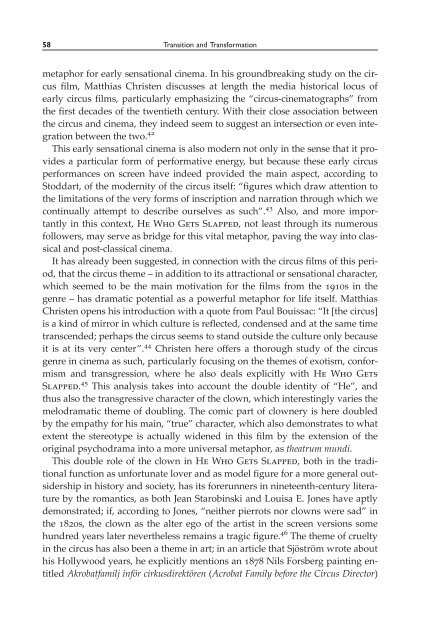FILM FILM - University of Macau Library
FILM FILM - University of Macau Library
FILM FILM - University of Macau Library
You also want an ePaper? Increase the reach of your titles
YUMPU automatically turns print PDFs into web optimized ePapers that Google loves.
58 Transition and Transformation<br />
metaphor for early sensational cinema. In his groundbreaking study on the circus<br />
film, Matthias Christen discusses at length the media historical locus <strong>of</strong><br />
early circus films, particularly emphasizing the “circus-cinematographs” from<br />
the first decades <strong>of</strong> the twentieth century. With their close association between<br />
the circus and cinema, they indeed seem to suggest an intersection or even integration<br />
between the two. 42<br />
This early sensational cinema is also modern not only in the sense that it provides<br />
a particular form <strong>of</strong> performative energy, but because these early circus<br />
performances on screen have indeed provided the main aspect, according to<br />
Stoddart, <strong>of</strong> the modernity <strong>of</strong> the circus itself: “figures which draw attention to<br />
the limitations <strong>of</strong> the very forms <strong>of</strong> inscription and narration through which we<br />
continually attempt to describe ourselves as such”. 43 Also, and more importantly<br />
in this context, He Who Gets Slapped, not least through its numerous<br />
followers, may serve as bridge for this vital metaphor, paving the way into classical<br />
and post-classical cinema.<br />
It has already been suggested, in connection with the circus films <strong>of</strong> this period,<br />
that the circus theme – in addition to its attractional or sensational character,<br />
which seemed to be the main motivation for the films from the 1910s in the<br />
genre – has dramatic potential as a powerful metaphor for life itself. Matthias<br />
Christen opens his introduction with a quote from Paul Bouissac: “It [the circus]<br />
is a kind <strong>of</strong> mirror in which culture is reflected, condensed and at the same time<br />
transcended; perhaps the circus seems to stand outside the culture only because<br />
it is at its very center”. 44 Christen here <strong>of</strong>fers a thorough study <strong>of</strong> the circus<br />
genre in cinema as such, particularly focusing on the themes <strong>of</strong> exotism, conformism<br />
and transgression, where he also deals explicitly with He Who Gets<br />
Slapped. 45 This analysis takes into account the double identity <strong>of</strong> “He”, and<br />
thus also the transgressive character <strong>of</strong> the clown, which interestingly varies the<br />
melodramatic theme <strong>of</strong> doubling. The comic part <strong>of</strong> clownery is here doubled<br />
by the empathy for his main, “true” character, which also demonstrates to what<br />
extent the stereotype is actually widened in this film by the extension <strong>of</strong> the<br />
original psychodrama into a more universal metaphor, as theatrum mundi.<br />
This double role <strong>of</strong> the clown in He Who Gets Slapped, both in the traditional<br />
function as unfortunate lover and as model figure for a more general outsidership<br />
in history and society, has its forerunners in nineteenth-century literature<br />
by the romantics, as both Jean Starobinski and Louisa E. Jones have aptly<br />
demonstrated; if, according to Jones, “neither pierrots nor clowns were sad” in<br />
the 1820s, the clown as the alter ego <strong>of</strong> the artist in the screen versions some<br />
hundred years later nevertheless remains a tragic figure. 46 The theme <strong>of</strong> cruelty<br />
in the circus has also been a theme in art; in an article that Sjöström wrote about<br />
his Hollywood years, he explicitly mentions an 1878 Nils Forsberg painting entitled<br />
Akrobatfamilj inför cirkusdirektören (Acrobat Family before the Circus Director)

















